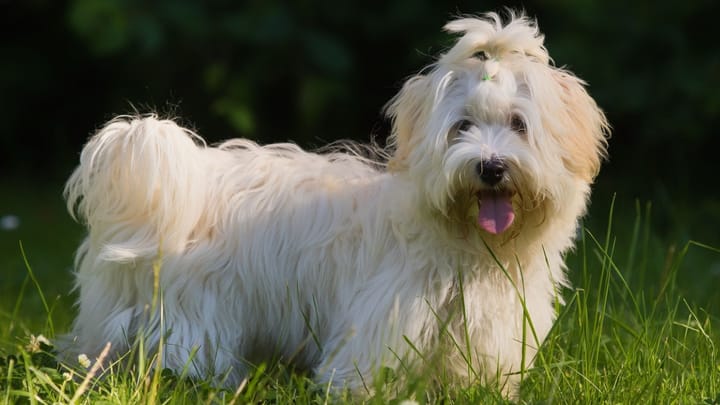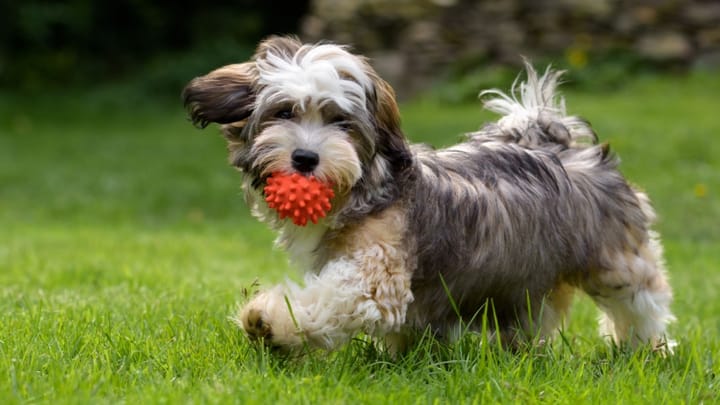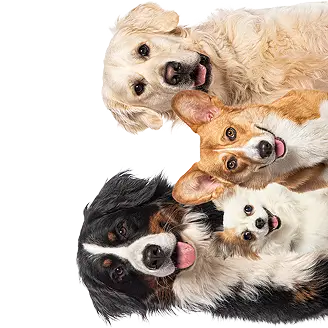Havanese
Other name: Havanese Silk Dog


The national dog of Cuba, the Havanese is a small companion dog. Despite being classed as a toy breed, the Havanese is a strong little canine with a well-balanced frame. They're lively, loyal, and very affectionate, common traits in many companion breeds. The Havanese is a highly social animal, meaning they'll need plenty of human or doggy company. Their most distinctive feature is their long, silky coat. This will require regular grooming if kept at its natural length, although many owners prefer to trim it quite short. A short-haired Havanese bears a striking resemblance to its close relative, the Bolognese Bichon.
|
Life expectancy |
The Havanese has a life expectancy of between 13 and 15 years |
|
Temperament |
|
|
Size |
Small
|
|
Adult size |
Female
Between 8 and 11 in
Male
Between 8 and 11 in
|
|
Adult weight |
Female
Between 9 and 13 lb
Male
Between 9 and 13 lb
|
|
Coat colour
A Havanese coat can be white, cream, fawn, chocolate brown, black, or a bluish grey. |
Sand Black White Brown Blue Cream |
|
Type of coat
A short, fluffy undercoat. A long and wavy outer layer. Double coated. Fluffy underlayer and soft, single outer coat. |
Long |
|
Eye colour
Always dark brown or black. |
Brown
|
|
Purchase price |
The Havanese costs between £815 and £1170 |
Although we love to praise and spoil our pets, it's important that they learn where they stand in the pecking order. Dogs are hierarchical animals; they need order and stability. Without it, they're unlikely to see you as the pack leader and will soon become aggressive, domineering, and unruly. This applies to the small dogs just as much as it does to the big dogs. So don't let them get away with too much. A Havanese with a bad case of ”small dog syndrome” will soon become a very big problem!
More details about the Havanese
Havanese: Origins and history
The origins of the Havanese began in Tenerife. These small, Bichon like dogs were then transported all over the world on passenger and merchant ships and became especially popular in Cuba. Then when they bred with members of the Bichon family, a crossbreeding which produced the modern Havanese (named after the Cuban capital, Havana.) After the communist revolution, a large number of middle-class Cubans fled to the United States and many of them took their Havanese dogs with them. The breed gained a small following among U.S. dog lovers and was first recognised by the American Kennel Club in 1996. Since then, its popularity has continued to grow; in 2013, the Havanese was named in a list of the 25 most popular breeds in the United States.
Physical characteristics of the Havanese
The Havanese is a compact dog with a well-proportioned frame. They have large, almond-shaped eyes, giving them a soft and endearing expression that adds to their loving natures. The ears are set quite low and hang down past the muzzle, which is quite short, even for a dog of its size. They have a well-balanced gait with a slight bounce in their step.
FCI classification of the Havanese
-
Group 9 - Companion and Toy Dogs
-
Section 1 : Bichons and related breeds
Havanese: Characteristics
Havanese: Behaviour
Training a Havanese
These dogs respond well to training and often perform very well in obedience training competitions. Just make sure you keep training sessions short and fun. Focus on making small, marginal gains over a longer period of time; don't overload with too much information at once.
Havanese: Lifestyle
Breed compatibility Havanese
Havanese: Purchase price
The average cost of a purebred Havanese puppy is somewhere between £815-£1170.
You'll also need to budget around £30-40 a month for feeding costs, and the average cost of a basic insurance policy is around £20,00 per month, although this varies from dog to dog. Grooming costs will vary. A long haired Havanese will require lots of attention, including regular trip to the doggy salon.
Havanese: Shedding
None
Havanese dogs are not prone to hair loss and shed very little.
Havanese: Grooming
Despite having naturally long coats, the Havanese is low-shedding breed. However, if you decide to keep their coats long, you’ll need to spend a lot of time keeping it in good condition. This will involve a daily brush, regular baths, and plenty of trips to the dog groomer. Alternatively, you could learn to do this yourself. This would be cheaper in the long term but expensive and time-consuming in the beginning.
Havanese: Health
The average lifespan for a Havanese is between 13-15 years.
These dogs are pretty tough for a toy breed. Their study, strong frames means they're tougher than they look, although, like any small dogs, they should always be handled with care. Walks in the local park are ok but stay away from more rugged terrain. It's likely to be too physically demanding for these companion dogs.
Havanese dogs have no real problem maintaining a healthy body temperature and are not prone to overheating. Still, avoid exercising them during the hottest part of the day.
His undercoat is not very thick, this little dog is doesn't like the cold weather.
These energetic dogs aren’t prone to obesity or weight gain. Still, their small frames are not designed to carry large amounts of weight. Feeding them the right amounts of food is a vital part of maintaining their short and long-term health.
- Liver disease
- Hip Dysplasia
- Cataracts
- Retinal dysplasia
- Patellar luxation
- Allergies






